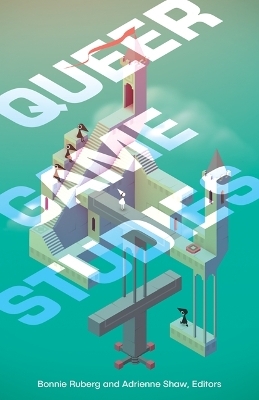
Queer Game Studies
University of Minnesota Press (Verlag)
978-1-5179-0037-3 (ISBN)
Video games have developed into a rich, growing field at many top universities, but they have rarely been considered from a queer perspective. Immersion in new worlds, video games seem to offer the perfect opportunity to explore the alterity that queer culture longs for, but often sexism and discrimination in gamer culture steal the spotlight. Queer Game Studies provides a welcome corrective, revealing the capacious albeit underappreciated communities that are making, playing, and studying queer games.
These in-depth, diverse, and accessible essays use queerness to challenge the ideas that have dominated gaming discussions. Demonstrating the centrality of LGBTQ issues to the gamer world, they establish an alternative lens for examining this increasingly important culture. Queer Game Studies covers important subjects such as the representation of queer bodies, the casual misogyny prevalent in video games, the need for greater diversity in gamer culture, and reading popular games like Bayonetta, Mass Effect, and Metal Gear Solid from a queer perspective.
Perfect for both everyday readers and instructors looking to add diversity to their courses, Queer Game Studies is the ideal introduction to the vast and vibrant realm of queer gaming.
Contributors: Leigh Alexander; Gregory L. Bagnall, U of Rhode Island; Hanna Brady; Mattie Brice; Derek Burrill, U of California, Riverside; Edmond Y. Chang, U of Oregon; Naomi M. Clark; Katherine Cross, CUNY; Kim d’Amazing, Royal Melbourne Institute of Technology; Aubrey Gabel, U of California, Berkeley; Christopher Goetz, U of Iowa; Jack Halberstam, U of Southern California; Todd Harper, U of Baltimore; Larissa Hjorth, Royal Melbourne Institute of Technology; Chelsea Howe; Jesper Juul, Royal Danish Academy of Fine Arts; merritt kopas; Colleen Macklin, Parsons School of Design; Amanda Phillips, Georgetown U; Gabriela T. Richard, Pennsylvania State U; Toni Rocca; Sarah Schoemann, Georgia Institute of Technology; Kathryn Bond Stockton, U of Utah; Zoya Street, U of Lancaster; Peter Wonica; Robert Yang, Parsons School of Design; Jordan Youngblood, Eastern Connecticut State U.
Bonnie Ruberg is Provost’s Postdoctoral Scholar in the Interactive Media and Games division at the University of Southern California and assistant professor in the Department of Informatics at the University of California, Irvine. The lead organizer of the Queerness and Games conference, she has written for The Village Voice, The Economist, and Wired. Adrienne Shaw is assistant professor in the Department of Media Studies and Production at Temple University and a Media and Communications PhD program faculty member. She is author of Gaming at the Edge: Sexuality and Gender at the Margins of Gamer Culture (Minnesota, 2014).
Contents
Introduction: Imagining Queer Game Studies
Adrienne Shaw and Bonnie Ruberg
Part I. Defining Queerness in Games
1. What Is Queerness in Games, Anyway?
Naomi Clark
2. Queergaming
Edmond Y. Chang
3. Queer Theory, the Body, and Video Games
Derek A. Burrill
4. Queering Games History: Complexities, Chaos, and Community
Zoya Street
Part II. Queering Game Play and Design
5. Ending the Cycle: Developing a Board Game to Engage People in Social Justice Issues
Peter Wonica
6. Playing Outside
Leigh Alexander
7. Building a Queer Mythology
Hanna Brady
8. For Play? Literary Ludics and Sexual Politics
Aubrey Gabel
9. Play and Be Real about It: What Games Could Learn from Kink
Mattie Brice
10. Queering the Snapshot: Ambient Mobile Play
Larissa Hjorth and Kim d’Amazing
Part III. Reading Games Queerly
11. On “FeministWhorePurna” and the Ludo-Material Politics of Gendered Damage Power-ups in Open-World RPG Video Games
Robert Yang
12. Welcome to My Fantasy Zone: Bayonetta and Queer Femme Disturbance
Amanda Phillips
13. Roleplay as Queer Lens: How “ClosetShep” Changed My Vision of Mass Effect
Todd Harper
14. Queer(ing) Gaming Technologies: Thinking on Constructions of Normativity Inscribed in Digital Gaming Hardware
Gregory L. Bagnall
15. On Gone Home
merritt kopas
Part IV. Queer Failures in Games
16. The Trouble with Communities
Adrienne Shaw
17. “Play Like a Girl”: Gender Expression, Sexual Identity, and Complex Expectations in a Female-Oriented Gaming Community
Gabriela T. Richard
18. The Nightmare Is Over
Katherine Cross
19. Queer Gaming: Gaming, Hacking, and Going Turbo
Jack Halberstam
20. The Arts of Failure: Jack Halberstam in Conversation with Jesper Juul
Moderated by Bonnie Ruberg
21. “I Wouldn’t Even Know the Real Me Myself”: Queering Failure in Metal Gear Solid 2
Jordan Youngblood
Part V. Queer Futures for Games
22. If Queer Children Were a Video Game
Kathryn Bond Stockton
23. Queer Growth in Videogames
Christopher Goetz
24. Finding the Queerness in Games
Colleen Macklin
25. Organizing New Approaches to Games: An Interview with Chelsea Howe, Toni Rocca, and Sarah Schoemann
Moderated by Bonnie Ruberg
26. Forty-Eight-Hour Utopia: On Hope and the Future of Queerness in Games
Bonnie Ruberg
Contributors
Index
| Erscheinungsdatum | 12.04.2017 |
|---|---|
| Zusatzinfo | 11 |
| Verlagsort | Minnesota |
| Sprache | englisch |
| Maße | 140 x 216 mm |
| Themenwelt | Sachbuch/Ratgeber ► Freizeit / Hobby |
| Informatik ► Weitere Themen ► Computerspiele | |
| Sozialwissenschaften ► Kommunikation / Medien ► Medienwissenschaft | |
| ISBN-10 | 1-5179-0037-9 / 1517900379 |
| ISBN-13 | 978-1-5179-0037-3 / 9781517900373 |
| Zustand | Neuware |
| Haben Sie eine Frage zum Produkt? |
aus dem Bereich


